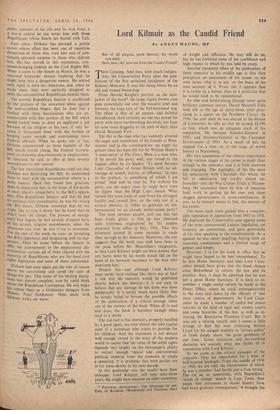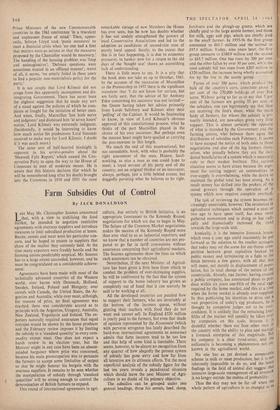Lord Kilmuir as the Candid Friend
By ANGUS MAUDE, MP
But of all plagues, good Heaven, thy wrath can send, Save, save, oh! save me from the Candid Friend!
"Vitus Canning. And thus, with much indigna- tion, the Conservative Party after the pub- lication of the first serialised instalment of the Kilmuir Memoirs. It was like being bitten by an old and trusted house-dog.
From Harold Knight's portrait on the dust- jacket of the book* the large, liquid brown eyes gaze mournfully out over the massive jowl and between the long ears of the full-bottomed wig. The effect is that of an earnest and faithful bloodhound. And certainly no one has served his party with more hardworking devotion, nor kept his nose more doggedly to the path of duty, than David Maxwell Fyfe.
Yet this is the man who has suddenly aroused the anger and resentment of his friends at West- minster and in the constituencies—an anger far greater than has been felt for Sir William Haley's `Conservative' in The Times. Here is a man who, if he served his party well, was raised to the highest office by its leaders. 'To have become Lord Chancellor of Great Britain with no ad- vantage of wealth, station, or influence,' he says in his preface, 'is something of which I am proud.' And well he may be. Yet without his panty, say the angry ones, he might have risen no higher than the High Court bench. What turned this most loyal of men from his strongest loyalty and caused him, on the very eve of a critical election, to inflict so grievous an em- barrassment on an already embarrassed party?
The most obvious answer, and one that has been freely given, is that he was obsessed with bitterness engendered by his sudden dismissal from office in July, 1962. That this bitterness existed in some measure is made clear enough in the memoirs. Moreover, the text suggests that the book may well have been in the press before Mr. Macmillan's resignation, so that Lord Kilmuir might not have known that any harm done by his words would fall on the head of an innocent successor to the man who dismissed him.
Despite this—and although Lord Kilmuir must surely have realised that there was at least a risk that his memoirs would be published shortly before the election—it is not easy to believe that any damage he has done was done deliberately. It is surely much more likely that he simply failed to foresee the possible effects of the publication of a critical passage taken out of the context of the book. When all is said and done, the book is harmless enough when read as a whale.
The sad fact is that memoirs, properly handled by a good agent, are now almost the only capital asset of a statesman who wants to provide for his children. And the statesman is not always well enough versed in the ways of the modern world to realise that the value of the serial rights depends very largely on the newspaper's ability to extract enough topical and controversial political material from the memoirs to create a sensation. It is probable that both parties are in for some shocks in the next decade.
In this particular case the results have been unhappy. Lord Kilmuir, still only sixty-three years old, might have become an elder statesman * POLITICAL ADVENTURE,: THE MEMOIRS OF THE EARL OF Ktutsunt. (Weidenfeld and Nicolson, 42s.) of weight and influence. He may still do so, but he has forfeited some of the confidence and high respect in which he was held by many.
Another incidental effect of the publication of these memoirs in his middle age is that they precipitate an assessment of his career on his own terms—that is to say, on the basis of his own account of it. From this it appears that it is rather as a lawyer than as a politician that he would wish to be remembered.
An able and hardworking (though never quite brilliant) common lawyer, David Maxwell Fyfe took silk at the age of thirty-three, after prac- tising as a junior on the Northern Circuit. In 1936, the year after he was elected to the House of Commons, he tells us that he earned £8,396 in fees, which was an adequate mark of his reputation. He, became Solicitor-General in 1942, and Attorney-General in the Caretaker Government of 1945. As a result of this, he stepped for a time on to the stage of world history at Nuremberg.
His own assessment of the relative importance of the various stages of his career is made clear enough in the memoirs, and it is both accurate and engaging. The highlights of his life were his association with Churchill—far whom he felt an admiration and loyalty almost un- bounded—and the War Crimes Trials at Nurem- berg. He succeeded there by dint of immense hard work in getting up his case and sheer dogged perseverance in cross-examination. It was, as he himself seems to feel, the summit of his career.
The same hard work gained him a consider- able reputation in opposition from 1945 to 1951. He deployed the Conservative case against some of the most controversial Labour legislation, sat tirelessly on committees, and gave generously of his time speaking in the constituencies. As a speaker he was never inspiring, having both an immobile countenance and a limited range of gesture and tempo.
However, it is for his work in office that he might have hoped to be best remembered. To be first Home Secretary and then Lord Chan- cellor should have given him the finest chance since Birkenhead to reform the law and its practice. Alas, it must be admitted that he was not a good Home Secretary. It is hard to -re- member a single useful reform he made at the Home Office, where he stuck unimaginatively to the lines laid down by the officials of that most costive of departments. As Lord Chan- cellor he made a number of useful but minor reforms in the field of legal aid, county courts and some branches of the law, as well as in- itiating the Restrictive Practices Court. But it was not a shining record, and it seems a little strange to find this man criticising Selwyn Lloyd for his alleged inability to `initiate policy' or think deeply about `the great problems of our ti-me.' Great initiatives and far-reaching decisions are scarcely what one thinks of in connection with Lord Kilmuir.
So we come to the critical passages of the merpoirs. They are remarkable for a kind of half-hearted hindsight. From the middle of 1958 to 1960, we are told, the Government of which he was a member 'had hardly,put a foot wrong.' The rot set in, apparently, with Macmillan's `winds of change' speech in Cape Town, than which `few utterances in recent history have had more grievous consequences.' It brought the
Prime Ministers of the new Commonwealth countries to the 1961 conference 'in a truculent and unpleasant frame of mind.' Then, appar- ently, Selwyn Lloyd took 'panic measures' to meet a financial crisis when `no one had a hint that matters were so serious or that the measures proposed by the Chancellor would be necessary.' The handling of the housing problem was `limp and unimaginative'; `Defence questions were sometimes treated in an offhand manner'; worst of all, it seems, 'we utterly failed in these years to find a popular non-materialistic policy for the party.'
It is not simply that Lord Kilmuir did not resign from this apparently incompetent and dis- integrating Government. There has never been the slightest suggestion that he made any sort of a stand against the policies of which he com- plains or fought for the initiation of better ones. And when, finally, Macmillan `lost both nerve and judgment' and dismissed him 'at seven hours' notice,' Lord Kilmuir was extremely indignant. (Incidentally, it would be interesting to know how much notice his predecessor Lord Simonds received to make way for Lord Kilmuir. I doubt if it was much more.) The same sort of half-hearted hindsight 'is apparent in his arriere-pensees about the 'Maxwell Fyfe Report,' which caused the Con- servative Party to open the way to the House of Commons to men of moderate means. He is aware that this historic decision (for which he will be remembered long after his death) brought into the Commons in 1950 and 1951 the most
remarkable vintage of new Members the House has ever seen; but he now has doubts whether it has not unduly strengthened the powers of local Conservative Associations and led to the adoption as candidates of second-rate men of purely local appeal. Surely, to the extent that this is in fact happening, it is due to economic pressures; to hanker now for a return to the old days of the 'bought seat' shows an astonishing lack of understanding.
There is little more to say. It is a pity that the book does not take us up to October, 1963. In the account of the succession of Macmillan to the Premiership in 1957 there is the significant statement that 'I do not know for certain, but am fairly sure, that the advice of Sir Anthony Eden concerning his successor was not invited'— the Queen having taken her advice primarily from Lords Salisbury and Kilmuir after their `polling' of the Cabinet. It would be fascinating to know, in view of Lord Kilmuir's obvious approval of this constitutional process, what he thinks of the part Macmillan played in the choice of his own successor. But perhaps even the stoutest heart might have quailed at carrying the post-mortem to this length.
We reach the end of this unsensational, but not unreadable, book, with what is probably the right assessment of the man. Honest, hard- working, as nice a man as one could hope to meet; a loyal servant of his party and of the country; not an original thinker or an innovator; always, perhaps, just a little behind events; but doggedly pursuing what he believes to be right.







































 Previous page
Previous page